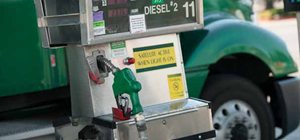With the way fuel prices have been increasing each w

eek, recently topping $4.00/gallon, it can be difficult to manage your cash flow when so much is being spent on fuel.Fuel is the owner operator’s number one expense, and that is not going to change any time soon. However, during times of high fuel costs, it is possible to increase your cash flow by reducing your fuel expense.
Here are some tips on reducing your fuel expense to increase your cash flow.
-
Fuel Surcharge. Receiving a fuel surcharge is an opportunity to make more money. If good habits are used for lowering fuel costs, and your truck is properly maintained for fuel efficiency, it is possible to have more cash on hand.
-
MPG is the key. Raising your MPG can decrease what you pay for fuel and significantly increase your income. If fuel is $4.00/gallon and the fuel surcharge is $.46, your cost per gallon at 6 MPG will be $1.25. If you can improve your MPG to 7, the base cost of fuel is only $.78/gallon. At 8.7 MPG, you are paying nothing for fuel. That will put a lot of money into your pocket. Henry Albert, one of the Pros on Team Run Smart, claims he has managed his MPG and fuel surcharge so efficiently that his monthly fuel expense is $0, so no excuses!
-
Use your carrier fuel network. Another easy way an owner-operator can help control costs and manage cash flow is to fuel within your carrier’s fuel network. Most carriers will provide their owner-operators a fuel card and automatically deduct the fuel expenses from your settlement. Having the fuel charges automatically deducted makes it’s easier to manage fuel expenses. You will save you time planning routes and save money at the pump because of the negotiated discounts.
-
Only purchase necessary fuel for your trip. When planning the fuel purchase for your trip, you must consider the distance you will travel and the amount of fuel you will need for that load. Begin by calculating your MPG. Remember that your mpg will vary with the load weight and terrain so you may need to recheck your MPG along the route. Then, calculate the amount of fuel you will need for that load and only purchase enough fuel for that load. If you buy too much fuel, you will have less cash because most carriers take the full payment for fuel from your settlement at the time it is purchased. Buying too much fuel can cause your settlement to come up unexpectedly short and leave you cashless for the week.
-
Find the cheapest fuel on your route. Purchase the least expensive fuel available on your route based on the net cost after the fuel tax has been removed.
Let’s examine the true cost of fuel on a trip through Indiana, $3.89; Illinois, $4.09, and Iowa, $4.02. At first glance, Illinois would seem like the worst place to purchase fuel. However, if you deduct the fuel tax, Illinois has the cheapest base price for fuel.
|
TRUE COST TO FUEL |
|
|
Indiana |
Illinois |
Iowa |
|
Price at the Pump |
$3.89 |
$4.09 |
$4.02 |
|
Fuel Tax |
$0.16 |
$0.41 |
$0.23 |
|
Net Fuel Price |
$3.79 |
$3.68 |
$3.79 |
By taking advantage of the fuel surcharge, purchasing fuel from your carrier’s network, buying fuel with the cheapest base cost, and purchasing only the fuel needed for the load can free up thousands of dollars per year.